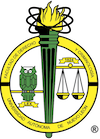The procedural impulse and administrative responsibility
DOI:
https://doi.org/10.29105/dj2.3-18Keywords:
proceso, procedimiento, impulso procesal, sujetos procesales, EstadoAbstract
The present investigation is carried out from the perspective of the Theory of the Process and the Administrative Law and analyzes the legal figures related to the process and procedures demonstrating their difference and legal nature in order to show that the procedural impulse must be the responsibility of the material subjects materiales and formales. However, the initiation of the action corresponds to the plaintiff and the defendant to continue with the procedural synergy of generating the next procedural phase included in the recognition of the procedural act issued by the corresponding jurisdictional authority, making it clear that it corresponds to the latter as a matter of function, making it`s property the process and give it continuity so that it is not suspended, since it breaches the State's purpose in the Justice System and, as a consequence, administrative responsibility.
Downloads
References
Alcalá-Zamora Y Castillo, Niceto. Proceso, Autocomposición y autodefensa. Contribución al estudio de los fines del proceso. Universidad Nacional Autónoma de México, México 1970.
Alcala-Zamora y Castillo, Nieto y Levené, Ricardo. Derecho Procesal Penal. 3 tomos. Editorial Guillermo Kraft. España 2008
Alsina. Hugo. Tratado Teórico Práctico de Derecho Civil Comercial. Tomo 2. Editorial Ediar. Argentina 2018.
Amigo, Aurora. Estructura del Estado. Editorial McGraw Hill. México 2007
Burgoa. Ignacio. Las Garantías Individuales. Editorial Porrúa. México 2010.
Carnelutti F. Sistema de Derecho Procesal. Editorial Uteha. Buenos Aires 1982.
Couture. Eduardo J. Fundamentos del derecho procesal civil. Tercera edición, Editorial Roque Depalma, Buenos Aires. 1974.
Chiovenda. Giuseppe. Principios de Derecho Procesal Civil. Tomo I. Biblioteca Jurídica de Autores Españoles y Extranjeros. España 2020.
De Angelis. Dante Barrios. Teoría del Proceso. Segunda Edición. Editorial B. de F Ltda. Uruguay 1998
Fairén V. Teoría General del Derecho Procesal. Universidad Autónoma de México. México 2013
Fraga. Gabino. Derecho Administativo. Editorial Porrúa. México 2011.
García Máynez, Eduardo. Lógica del juicio jurídico. Fondo de Cultura Económica. México 1955. DOI: https://doi.org/10.22201/iifs.18704913e.1955.1.1429
Golschmidt. Werner.citado por Alsina, Hugo. Fundamentos del derecho procesal. Ubijus, Editorial S.A. de C.V. México 2016
Heller. Herman. Teoria del Estado. Fondo de cultura economica. 2da edición. México 1998.
Lois Estevez, José. Citado por Cipriano Goméz Lara. Teoria General del Proceso. Editorial Oxford University Press. México 2012
https://archivos.juridicas.unam.mx/www/bjv/libros/1/41/13.pdf.
López-Chávez. Ricardo Nugent. El impulso y la preclusión procesales. Revista Derecho PUCP. Número 13 (año1953). Editorial Pontificia Universidad Católica del Perú.
http://revistas.pucp.edu.pe/index.php/derechopucp/article/view/13242
Ovalle Favela. José. Teoría General del Proceso. Sexta edición. Editorial Oxford University Press. México 2019.
Palacios, Ramón J. Instituciones de amparo, Editorial Cajica. Puebla 1963
Porrúa Perez.Francisco. Teoría del Estado. Editorial Porrúa. México 2019.
Prieto-Castro y Ferrandiz. Leonardo y Eduardo Gutíerrez de Cabiedes y Fernández de Heredía. Derecho Procesal Penal. Cuarto Edición. Editorial Porrúa. México 2019
Downloads
Published
How to Cite
Issue
Section
License
Copyright (c) 2022 Journal of Legal Challenges

This work is licensed under a Creative Commons Attribution-NonCommercial 4.0 International License.
The authors who publish in this journal accept the following conditions:
- Authors will retain their copyright and guarantee the journal the right of first publication of their work, which will be simultaneously subject to the Creative Commons Attribution-NonCommercial 4.0 International License. That allows third parties to share the work as long as its author and its first publication are indicated in this magazine.
- Authors may make other independent and additional contractual agreements for the non-exclusive distribution of the version of the article published in this journal (eg, include it in an institutional repository or publish it in a book) provided that they clearly indicate that the work it was first published in this magazine.
- Authors are allowed and recommended to publish their work on the Internet (for example on institutional or personal pages) after the review and publication process, as it can lead to productive exchanges and a greater and faster dissemination of the published work ( See The effect of open access).







